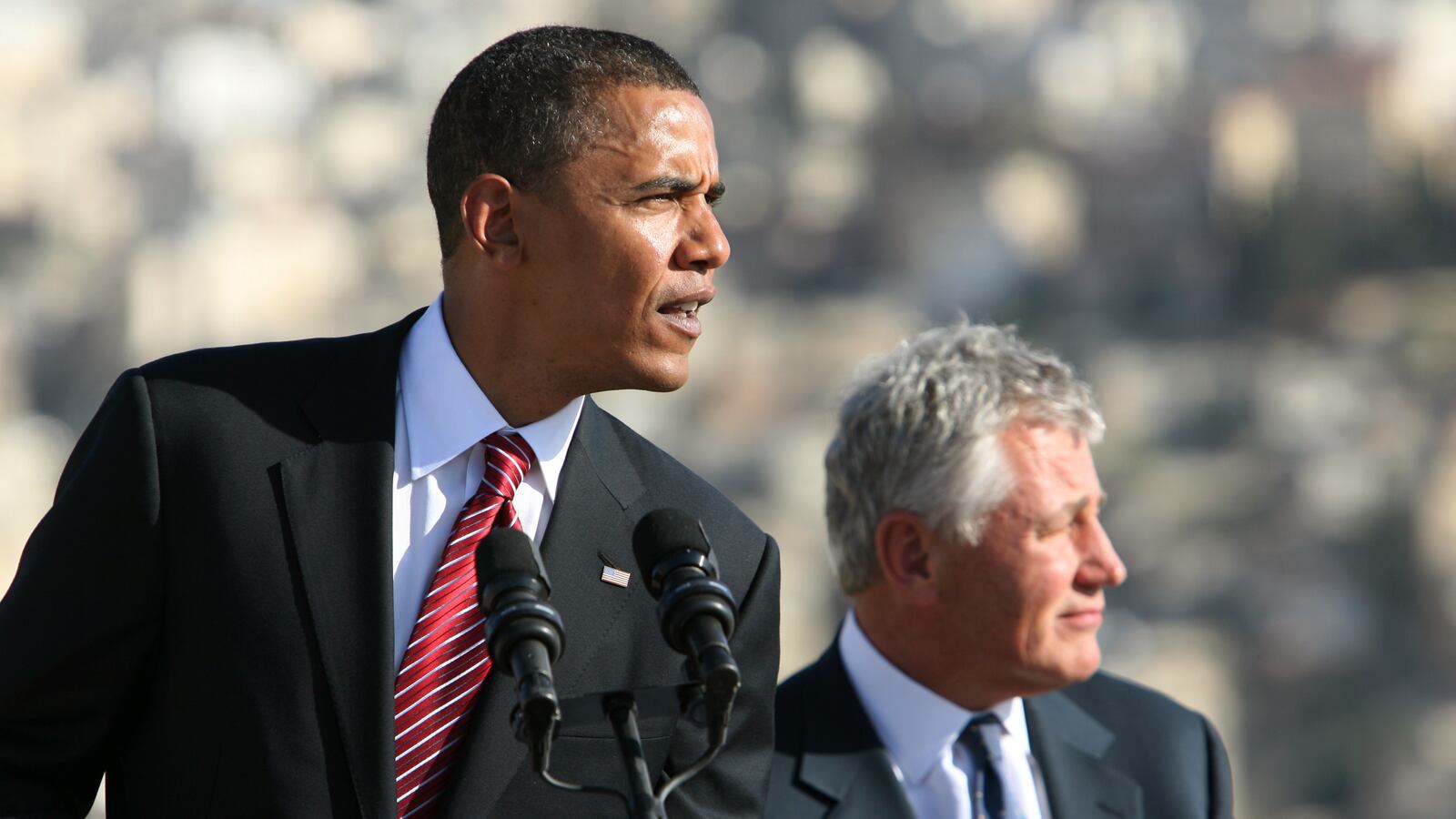From the beginning, Chuck Hagel’s nomination as secretary of defense has been about more than just the policies he’d pursue at the Pentagon. It’s been about the terms of legitimate discourse in Washington, D.C. And in this regard, even though he’s yet to be confirmed, Hagel is already proving an agent of change.He’s proving an agent of change because over the past week or so, for the first time I can remember, the Jewish right’s tactic of calling people they disagree with on Israel policy anti-Semitic has begun to backfire.

In the beginning, the script seemed to be playing out in familiar ways. On Dec. 13, after reports surfaced that President Obama might pick Hagel, an anonymous Senate aide emailed the Weekly Standard to warn: “Send us Hagel and we will make sure every American knows he is an anti-Semite.” The aide added, “Hagel has made clear he believes in the existence of a nefarious Jewish lobby that secretly controls U.S. foreign policy. This is the worst kind of anti-Semitism there is.”
That’s how it started: an anonymous attack on Hagel for something he never said. Hagel had never said the “Jewish lobby secretly controls U.S. foreign policy.” He had said the “Jewish lobby”—an imprecise but hardly offensive term given that American Jewish officials use it themselves—“intimidates a lot of people up here.” That statement, which was praised for its honesty by the man Hagel said it to, the (Jewish) former Clinton administration peace processor Aaron Miller, is anti-Semitic only if you believe it is anti-Semitic to suggest that AIPAC—like every other major lobby group in Washington—cultivates the impression that consistently disagreeing with them could cost members of Congress their seats. If AIPAC doesn’t cultivate that impression, it’s not doing its job.
Four days after that, in a column entitled “Chuck Hagel’s Jewish Problem,” Bret Stephens in The Wall Street Journal wrote that when Hagel “carries on about how ‘the Jewish lobby intimidates a lot of people up here,’ the odor [of prejudice] is especially ripe.” The next day, The Washington Post’s Jennifer Rubin accused Hagel of “rank prejudice against American Jews.” She also quoted the Anti-Defamation League’s Abe Foxman as stating that “the sentiments he’s [Hagel’s] expressed about the Jewish lobby border on anti-Semitism in the genre of professors John Mearsheimer and Stephen Walt and former president Jimmy Carter.”
Foxman never bothered to explain why such comments border on anti-Semitism, or what Mearsheimer, Walt, and Carter had said that qualified them for the epithet too. In fact, Mearsheimer and Walt have explicitly rejected the term “Jewish lobby.” As for Carter, it’s hard to see why he’s relevant to the conversation at all, since his most controversial Israel-related comments have nothing to do with the “Jewish” or “pro-Israel” lobby. What’s gotten Carter in trouble is his claim that Israel risks becoming an “apartheid state” if it makes permanent its control of the West Bank (something Ehud Barak and Ehud Olmert have warned of too). But while leveling his drive-by accusation of anti-Semitism against Hagel, Foxman threw in Carter for good measure.
Then, on Jan. 7, the Council on Foreign Relations’ Elliott Abrams told NPR that Hagel “appears to be … frankly an anti-Semite.” Abrams based this conclusion not only on Hagel’s “Jewish lobby” quote, but on what Abrams called “the statements by the Nebraska Jewish community—about his unresponsiveness to them, his dismissal of them, his hostility to them.” Abrams’s source appeared to be an article in the Jewish newspaper Algemeiner, which quotes some Jewish Nebraskans grumbling about Hagel’s unresponsiveness. The problem with that assertion, as The Forward has since detailed, is that while people in Nebraska’s Jewish community’s differ in their views on Hagel, “Jews in Nebraska on both sides of Hagel’s confirmation fight emphatically refute the [anti-Semitism] charge.”
So far, so familiar. Over roughly the last year, hawkish Jewish officials and pundits have hurled the anti-Semitism charge at several left-of-center institutions and columnists. Rubin and the Anti-Defamation League have wielded it against the Center for American Progress. Abrams has accused Thomas Friedman and Joe Klein of “spreading the two major themes of contemporary American anti-Semitism.” The Weekly Standard has denounced “the anti-Semitism—the pure, unadulterated bigotry—witnessed at the Occupy Wall Street protests.”
What’s new about the Hagel case isn’t the promiscuous charge of anti-Semitism. It’s the pushback against it. One New York Times columnist, Thomas Friedman, has called the claim that Hagel is an anti-Semite “disgusting.” Another, Nick Kristof, has called it “shameful.” In The Washington Post, Richard Cohen has accused Stephens of “character assassination.” Abrams’s boss at the Council on Foreign Relations, Richard Haass, has forcefully rejected even the claim that Hagel is anti-Israel, let alone anti-Semitic.
And in response, lo and behold, the accusers are starting to retreat. In a statement last week, Foxman not only declined to repeat the anti-Semitism charge but said the ADL would not oppose Hagel’s nomination. In a new column about Hagel posted this weekend, Abrams, while still critical of the former Nebraska senator, writes, “I will avoid the term anti-Semitism, because it can mean too many different, particular things, and does not help illuminate the nature of the issue I discussed.” In an interview on Fareed Zakaria GPSyesterday, Stephens suggested that while he had claimed Hagel’s statements emitted “an odor of prejudice,” he had not called him an anti-Semite.
Why has the anti-Semitism attack stopped working? Two reasons. First, because when the president of the United States isn’t cowed, others take heart. By actually nominating Hagel, and calling the bluff of the Al Sharptons of the Jewish world, Obama revealed them to be less powerful than many had feared. Second, because the Hagel nomination isn’t really about Israel. It’s about the broader direction of American foreign policy. For years, the anti-Semitism charge has been used to marginalize not merely voices skeptical of Israeli policy toward the Palestinians, but voices skeptical of American war with Iran. By nominating Hagel, Obama is sending the message that the Iran debate is too important to be circumscribed by these kinds of attacks. Just as he didn’t let Benjamin Netanyahu force him to set a date for military action last fall, Obama is now rebuffing another effort to limit his freedom of maneuver on questions of war and peace.
What role Hagel plays in Obama’s Iran policy remains anyone’s guess. But simply by being nominated, Hagel has dealt a blow to the silly, lazy charges of anti-Semitism that have grown commonplace in Washington in recent years. And that alone is reason for enthusiasm.






